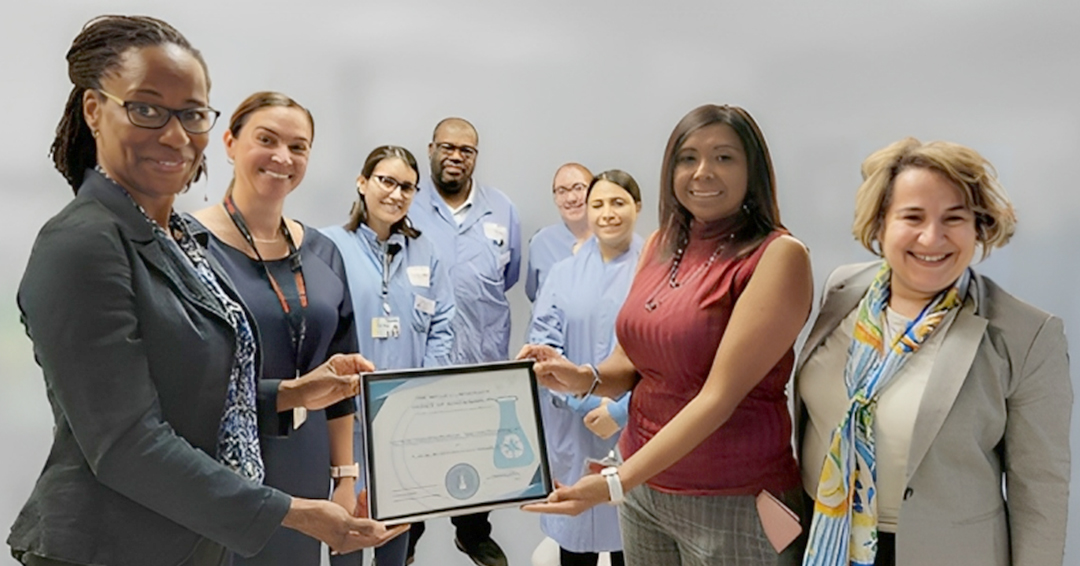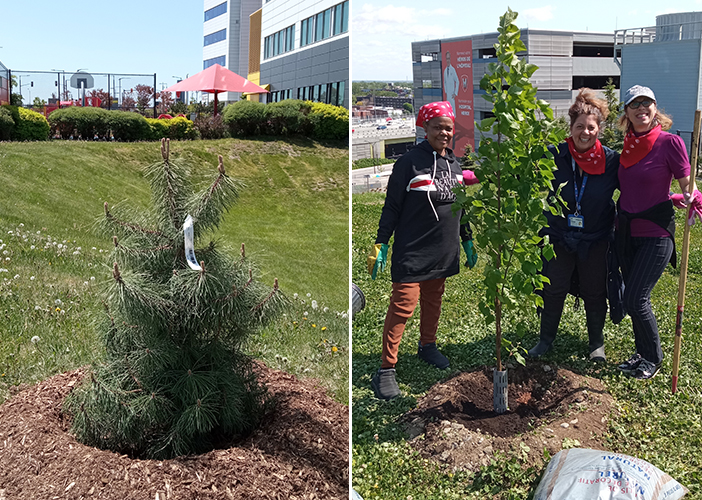
In the International Freezer Challenge, the numbers speak for themselves. Participants in this worldwide competition have saved 20.7 million kilowatt-hours (kWh) of energy by improving cold storage management at laboratories around the globe. This impressive savings corresponds to about 14,600 metric tons of carbon dioxide equivalent or the annual electricity use of 1,804 Canadian homes.
In August 2023, the McGill Office of Sustainability announced that the Specimen Processing Laboratory at the Centre for Innovative Medicine (CIM) was the first-place winner of the International Freezer Challenge among all the university’s participants.
Located at the Glen site of the Research Institute of the McGill University Health Centre (RI‑MUHC), the Specimen Processing Laboratory is one of 16 labs across McGill that took part in the competition organized internationally by My Green Lab and the International Institute for Sustainable Laboratories, and locally by the McGill Office of Sustainability. Principal investigators, trainees and lab managers at McGill University joined more than 1,900 labs in 27 countries, implementing sustainable management practices for fridges and freezers such as inventory management and regular defrosting, thus saving significant amounts of energy, space and money.
“Between August 2022 and June 2023, the CIM lab’s cold storage management practices saved an estimated 44.9 kWh of electricity by measurably improving their cold storage management,” said Kimberly John, sustainability officer at the McGill Office of Sustainability. “Their documented practices in temperature and inventory management, preventative maintenance and energy efficiency earned them first place in the competition. Congratulations to this winning team, and to the other RI-MUHC teams in the labs of Dr. Renzo Cecere and Dr. Ivan Litvinov, who also participated and performed admirably!”
“We could not have done this without the efforts of many people at the RI-MUHC,” said Edna Milbrandt de Paz, laboratory supervisor at the CIM. “It’s not only the staff of this laboratory. We need to thank the RI-MUHC’s Technical Services team, who really helped us optimize our cold storage efficiency through effective product selection and regular preventative maintenance.”
The Specimen Processing Laboratory at CIM was also the first laboratory to be certified Platinum under McGill’s new Sustainable Lab Certification program. Developed by the Office of Sustainability, this program offers guidance to laboratories at McGill as they seek to reduce their environmental impact without compromising lab safety and research excellence. To achieve certification, lab personnel must tackle eight categories of actions to make their operations more sustainable.
The CIM lab’s Freezer Challenge win has earned them one year of free preventative maintenance of cold storage units from Lab Med Solutions, $500 worth of cold storage and energy-saving lab equipment, plus a pizza party.
A push for greater sustainability across the RI-MUHC
Becoming more environmentally friendly and eco-responsible can be as simple as turning off the lights in an unoccupied room or commuting by public transit. But at the RI-MUHC, our researchers, trainees and staff all want to do more. In collaboration with the MUHC Sustainability Committee, the RI-MUHC Technical Services team is taking concrete action to reduce the environmental footprint of our organization.
Across the RI-MUHC, the engineers and specialists in the Technical Services group work with research teams to deal sustainably with waste, including unneeded equipment, electronics, furniture, metals, used batteries and more. Many programs are available at no cost, such as RecycFluo, a non-profit program that accepts the RI-MUHC’s mercury-containing light bulbs and fluorescent tubes and recycles them responsibly, free of charge.
The annual laboratory spring clean-up is another sustainability initiative driven by the RI-MUHC Technical Services team. Over the past two years, the spring cleanup has been organized in conjunction with Earth Day. This event reminds the research community that lab work is not only safer and more pleasant in a clean and organized space; it is also more sustainable. The efficient management of valuable lab space can reduce our energy footprint, as a recent sustainability report from Harvard University has demonstrated. The report revealed that labs were the largest drivers of greenhouse gas emissions on campus, making up 50% of energy use while occupying only 23% of the square footage.
This year, the Technical Services team worked for the first time with an external recycling firm, MultiRecycle, to safely dispose of waste from the annual spring cleanup in an eco-friendly manner. Experts in triage of recyclable materials, MultiRecycle was able to redirect materials away from landfill and recuperate much of the discarded material. In its report for the RI‑MUHC, MultiRecycle noted that 493 kilograms of electronic materials were triaged, as well as 1,420 kg of appliances containing freon, 3,126 kg of residual materials (including fibre, glass and metals), 27 kg of batteries and 42 kg of various plastics.

In addition to recycling as part of the spring cleanup, the Technical Services team is evaluating a new pilot program for plastics. Working with the Translational Research in Respiratory Diseases Program, the Environmental Health and Safety team and the company MultiRecycle, the Technical Services team is evaluating how to safely and effectively recycle more laboratory plastics, including gloves. More details will follow as this pilot program evolves.
Within the MUHC hospitals, many more projects are under way to reduce, reuse, recycle and rethink. The Sustainable Development section on the MUHC intranet shares details about these efforts. Projects include major renovations to the waste centres at the Lachine Hospital and Montreal General Hospital to optimize their recycling potential, as well as improvements to the biomedical waste collection process and various recycling and composting pilot projects. At a tree-planting event this summer, MUHC and RI-MUHC employees planted native trees around the grounds of the Glen site.

“Although there is still a great deal more work to do, we can be proud of the growing number of sustainability initiatives at the RI-MUHC,” says Rami Tohme, director of Technical Services at the RI-MUHC and a member of the MUHC Sustainability Working Group. “We are aiming to use energy more efficiently, protect our natural environment, and manage our use of resources in a more sustainable manner.”
Anyone with ideas and interest in these projects is welcome to contact the Sustainability Working Group at info.rits@muhc.mcgill.ca.
About the International Freezer Challenge
The International Freezer Challenge is an annual competition that promotes energy-efficient cold storage management by encouraging labs to defrost and clean fridges and freezers. Launched globally in 2017 and organized by My Green Lab and the International Institute for Sustainable Laboratories (I2SL), the International Laboratory Freezer Challenge has saved 44.7 million kWh worth of energy to date, reducing CO2 emissions by 31,678 metric tons. In 2023 the McGill Office of Sustainability coordinated the International Freezer Challenge at McGill for the first time, organizing an internal competition for McGill labs and affiliated research institutes.
Is your lab is up for the Challenge? Learn more about the International Freezer Challenge.
